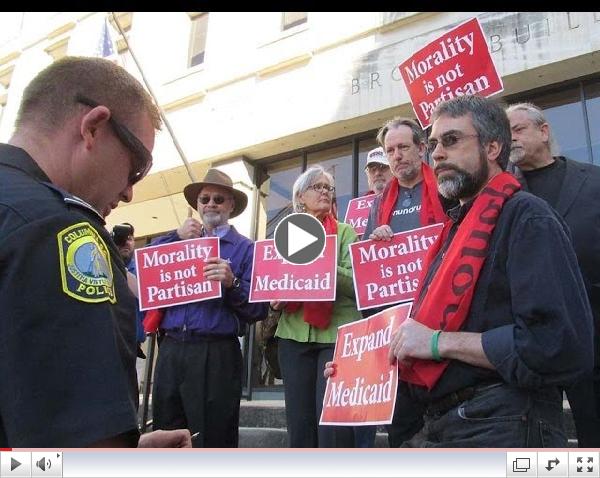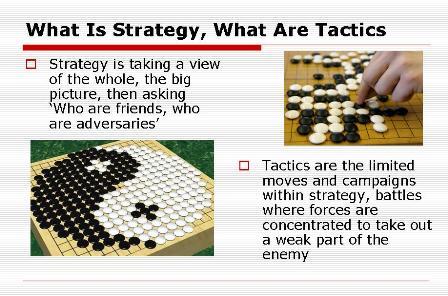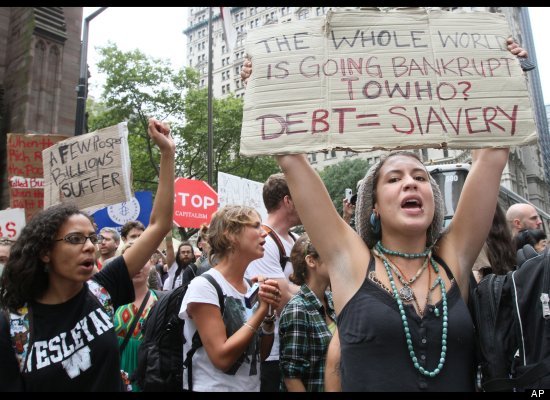 | Arrests at 'Truthful Tuesday'
in South Carolina |
|
 | |
Journal of the Black Left Unity Network
|
|

New CCDS Book Reporting on Vietnam
|
 The new annual edition of our journal of discussion and analysis is now out. More than 130 pages, it includes 20 articles on organizing, racism and the right. Cost is $10 plus shipping. Or get one by becoming a sustainer. Click the title to buy it directly. The new annual edition of our journal of discussion and analysis is now out. More than 130 pages, it includes 20 articles on organizing, racism and the right. Cost is $10 plus shipping. Or get one by becoming a sustainer. Click the title to buy it directly.
|
|
Radical Jesus:
A Graphic History of Faith  By Paul BuhleHerald Press By Paul BuhleHerald Press
|

Want to Know what CCDS has
been doing...Check it Out!
|
 Keep On Keepin' On Keep On Keepin' OnWhy Socialists Run in Elections, Strategy and Tactics Slide Slow, Class and Privilege, the Green New Deal ...and other Short Posts on Tumblr by Carl Davidson
|

Edited by Carl Davidson Revolutionary Youth the the New Working Class: The Praxis Papers, the Port Authority Statement, the RYM Documents and other Lost Writings of SDS
Changemaker, 273pp, $22.50
For the full contents, click the link and view 'Preview' under the cover graphic.
|
|
By Randy Shannon, CCDS

"Everyone has the right to work, to free of employment, to just and favorable conditions of work and to protection against unemployment."
- United Nations Universal Declaration of Human Rights, December 10, 1948
I. Introduction
The "Great Recession" that began in 2007 has caused the greatest percent of job losses since the Great Depression of 1929. This crisis is the end of an era of unrestrained 'neo-liberal' capitalism that became public policy during the Reagan administration. The crisis marks a new level of instability with the growth of a global financial elite that targeted US workers and our trade unions after World War II.
|
|
Order Our
Full Employment Booklets
 |
...In a new and updated 2nd Edition
Capitalism may well collapse under its own excesses, but what would one propose to replace it? Margaret Thatcher's mantra was TINA...There Is No Alternative. David Schweickart's vision of "Economic Democracy" proposes a serious alternative. Even more fundamentally, it opens the door to thinking about alternatives. His may or may not turn out to be the definitive "successor system," but he is a leader in breaking out of the box. |
 by Paul KrehbielAutumn Leaf Press, $25.64
by Paul KrehbielAutumn Leaf Press, $25.64 | | Shades of Justice Video: Bringing Down a President, Ending a War |
|
 By Giuseppe Fiori
Verso, 30 pages
|

Essays on Mondragon, Marx, Gramsci
and the Green and Solidarity Economies |
Solidarity Economy:What It's All About

Edited by Jenna Allard, Carl Davidson and Julie Matthaei
Buy it here...
|

- Foreword by Susan Brownmiller
- Preface by Ken Wachsberger
$37.50 + $6 shipping
|
|
Discussion Documents for a Militant Movement

By Don Hamerquist
|
|
|
|
An Invitation to CCDSers and Friends...
 Taking Aim at Taking Aim at
Finance Capital
and the Right
We're the Committees of Correspondence for Democracy and Socialism...Do you have friends who should see this? Pass it on...Do you have a blog of your own? Others you love to read every day? Well, this is a place where you can share access to them with the rest of your comrades. Just pick your greatest hits for the week and send them to us at carld717@gmail.com! Most of all, it's urgent that you oppose war on Iran, defend voter rights, plan for 2014 races now, oppose austerity, support the 'Moral Mondays' in North Carolina, the Congressional Progressive Caucus' 'Back to Work Budget'! We're doing more than ever, and have big plans. So pay your dues, make a donation and become a sustainer. Do it Now! Check the link at the bottom... |
In Show of Direct Democracy,
Vermont Pushes for Public Bank

Fifteen towns approve resolution that would establish bank that works for people of Vermont, not Wall Street By Jon Queally
Common Dreams
March 6, 2014 - By a more than three-to-one margin on Tuesday, communities voting on whether to support the creation of a public bank in Vermont approved the idea, calling for the state legislature to establish such a bank and urging passage of legislation designed to begin its implementation.
In a show of direct democracy that also exposed the citizenry's desire for a more localized and responsible banking system, fifteen of nineteen towns passed the resolution during 'Town Meeting Day'- an annual event in which voters choose local officials, approve municipal budgets, and make their voices heard on a number of measures put before local residents for approval.
The specific proposal under consideration, Senate Bill 204, would turn an existing agency, the Vermont Economic Development Authority, into a public bank that would accept deposits and issue loans for in-state projects. Currently, the only state in the U.S. to maintain a public state bank is North Dakota. However, since the financial downturn of 2008, other states have looked into replicating the North Dakota model as a way to buck Wall Street while taking more control of state and local finances.
Voicing his support of the measure ahead of Tuesday's vote, Gary Murphy, a resident of South Ryegate, one of the towns that subsequently approved the measure, explained the thinking behind the plan this way in a letter to the local Times-Argus:
Senate bill 204 would expand the Vermont Economic Development Authority to become a state bank and would start out by depositing 10 percent of Vermont's unrestricted money into the state bank. The bank would be able to leverage this money by means available only to banks to bolster the economy of the state and cut down on the interest payments and fees that are presently paid to out-of-state financial institutions and other entities. The bank would not engage in retail banking and would not compete with community banks; it would work with community banks to maintain their viability and expand their ability to help create better economic outcomes for Vermonters by partnering with them in projects they would not be able to engage in on their own....(Click title for more)
|
|
How the GOP Ambushed the VW Union Election

By John Logan Truthout
March 11, 2014 - Congressional Republicans and anti-union organizations have adopted the term "ambush elections" to describe new NLRB rules on union certification, but the real ambush of recent weeks was the GOP threats and intimidation against Volkswagen workers.
Last week, Republicans on the House Education and Workforce Committee held what is becoming a depressing ritual: another hearing aimed at attacking the National Labor Relations Board (NLRB), premised on the right-wing fairytale that the union certification process is biased in favor of workers who want a union.
Congressional Republicans and anti-union organizations have adopted the preposterous term "ambush elections" to describe the NLRB's new rules that would eliminate the worst cases of deliberate delay in union recognition elections. Republicans know that employers will still have ample opportunity to force their anti-union message onto employees, and even with the new election rules, the NLRB election process will remain stacked in favor of corporations and their highly paid "union avoidance" consultants.
Chairman John Kline (R-Minn.) stated that the new rules would "stifle employers' free speech and cripple workers' free choice." Kline's comments bare no relation to reality. Consider the advice that Jackson Lewis - one of the nation's largest law firms that specializes in defeating organizing campaigns - gives to employers: "Time is on your side" during NLRB elections, and a lengthy pre-election delay can be a "killer" for union organizing campaigns. Deliberate employer delay in the union certification process is a significant problem, as Kline well understands.
Kline wants us to believe that corporations such as Walmart don't have sufficient opportunity to browbeat their employees into opposing unionization. He favors legislation guaranteeing a five-week minimum for employers to mount aggressive anti-union campaigns (the comically mistitled Workforce Democracy and Fairness Act). Even more laughable, an attorney for the anti-union National Right to Work Committee claimed the NLRB's new rules would "impair the ability of employees to educate themselves about the pros and cons of unionization." Corporations like Walmart, Target and McDonald's are highly skilled at "educating" workers about the cons of unionization, often starting on day one of their employment.
As Rep. George Miller (D-Calif.) pointed out, however, there are people attempting to ambush union elections, including certain members of Congress. Indeed, last month Sen. Bob Corker (R-Tenn.) pulled off one of the greatest ambushes in the history of NLRB elections....(Click title for more)
|

By Bill Fletcher, Jr.
Progressive America Rising via Black Commentator
To the Point
I first met Bernie Sanders in the late 1980s. He was contemplating a run for Congress and had chosen to take time to study and teach at Harvard's Kennedy School of Government. We went out to lunch one afternoon.
Sanders was already a legend. An avowed socialist who had served as mayor of Burlington, Vermont, he struck me as someone who was quite thoughtful and prepared to listen to views other than his own. We chatted about a matter that has preoccupied me for much of the last thirty years: How to build a national electoral project that is truly progressive and also focused on the fight for power.
Sanders went on to win election to Congress and, ultimately, the U.S. Senate. He has been outspoken on virtually every issue that matters to working people and is unapologetic in his critique of capitalism. At the same time, he works to build unity among progressives rather than simply staking out his claim and expecting people to rally to his flag.
I don't live in Vermont, but without question, Bernie Sanders is my Senator.
For the last few months, the word on the street has been that Sanders is contemplating a run for the Presidency. Sanders has hinted at the possibility but has not confirmed or denied that he may take the plunge.
Excitement around a possible Sanders run is palpable. After more than one term of the complicated, neoliberal Presidency of Barack Obama-combined with the relentless assaults by the political right on all that for more than sixty years appeared sacred-there is a deep and clear desire among many for a different direction.
Yet a Sanders run brings its own complications.
One issue is whether Sanders should run as a Democrat or as an independent.
There are many progressives and leftists who will automatically suggest, out of disgust with the Democrats, that Sanders should make a "pure" run as an independent. Yet this raises an even more fundamental question: Why should Sanders run at all?
It only makes sense to run for the Presidency of the United States-as a progressive or leftist-if the person is both running to win and running as part of a broader electoral project. A run just to "show the colors" or make a statement is a waste of time. Running for President is both too expensive and time-consuming for that.
On the other hand, if the candidate has a real mass base, is building a broad progressive front around a clear, transformational program, and sees the candidacy as one step in a multitiered process, then it might be worth going for it.
But in suggesting this, I do so with qualifiers. Too many candidates who suggested that they were interested in building a grassroots movement that would transcend their campaigns only to see such candidates close up shop afterwards. A Sanders run as part of a longer-term effort at movement-building and energizing a progressive front only makes sense if there is a demonstrable commitment by the candidate to do the right thing after the election.
Let's take an example of what not to do. After Obama's successful 2008 run, there were many people who assumed he was going to keep his campaign organization together as a sort of independent force. But Obama moved it into the Democratic Party instead.
Then there was the choice that Jesse Jackson made in March 1989 when, following the 1988 elections, he completely reorganized the National Rainbow Coalition into an organization that he totally controlled rather than the mass democratic organization that many of its members had thought that they were building.
If a run makes sense, and I think Sanders might be the candidate who would turn his campaign into something lasting, the question is how to do it. I believe that Sanders needs to make a strategic decision to run within the Democratic primary system for the nomination. Despite the discontent with the electoral system among so many people in the United States of America, it is not likely that an independent candidacy at this moment can win. Should the Republican Party fracture, which is a real possibility over the next few years, all bets would be off. But as long as the Republicans stand firm as a hard, rightwing party, it is unlikely that at the national level an independent candidacy can win.
Quite explicitly, I am suggesting that winning must be a major objective of the campaign. The campaign needs to be organized in such a way that it aims to build an electoral coalition that is interested in gaining power, is committed to winning, and has a plan for governing. ...(Click title for more)
|

By Julia Meszaros
Huffington Post
"Prison ain't the place to find your right of passage in, it's slavery, with nasty food in your abdomen." --Immortal Technique (Parole, The 3rd World)
March 11, 2014 - Unfortunately, for increasing numbers of teenage African American and Latino males, prison is becoming a rite of passage and their presence in juvenile detention facilities has become more and more profitable. Nearly forty percent of American juvenile detention facilities are private and in Florida, it is 100 percent.
Increasingly, financially strapped states hire private prison corporations to run their incarceration facilities in order to gain a large financial payout. This seemingly 'logical' financial move by states to outsource their incarceration to private companies makes imprisonment a newly booming business. While the government's goal for incarcerating people is to 'rehabilitate' them into becoming productive members of society, private prison companies' goals for incarcerating people is to make profits through keeping prison beds filled (thus, the private companies require states to meet a certain quota of prisoners). At the same time that states are pouring more money into incarceration, they are slashing their educational budgets. The concurrent defunding of public education and the privatizing of juvenile detention facilities is creating a school to prison pipeline that is heavily racialized and gendered.
The "school-to-prison pipeline" highlights the racial inequalities associated with incarceration and educational opportunities within the U.S. Most of the students targeted for disciplinary action at public schools are male, African American, Latino, low-income, or disabled. Disabled African American students are suspended at three times the rate of their disabled white peers. One in three African American men will spend time incarcerated, and one in seven Latino men. The massive public school closures occurring in urban centers like Chicago and Oakland are leaving thousands of children without an option for education, pushing them towards the privatized juvenile facility beds. Teaching at a public university in Miami-Dade county has opened my eyes to the ways in which urban public schools have largely become prisons: my students would tell me about armed police, metal detectors, metal bar doors that would lock students inside, and feeling threatened enough to carry weapons to school. This 'conditioning' of lower income and minority students to prison-like conditions in their educational setting makes it an easier 'transition' for when they do eventually end up in some form of correctional facility. Noam Chomsky calls the War on Drugs and massive incarceration of nonviolent offenders the rich man's counterinsurgency.
Many people argue that private prisons are more cost effective than state run prisons and provide financial savings to taxpayers. This mythos of cost effectiveness has been debunked by a recent Yale economic study. While private prisons do have lower costs on average per prisoner, the high increased rates of recidivism after release from a private prison makes it actually more costly in the long term. There have been reports of increased physical and sexual abuse occurring in private prisons. The U.S. Department of Justice released a report that states 9.5 percent of juveniles in detention facilities are subject to sexual abuse. Instead of educating children in low income urban areas, our society decides it is a better investment for taxpayers to incarcerate them. However, as the Yale study pointed out, prisons are definitely not more cost-effective than education in preventing criminality. Despite all this evidence that private prisons, and incarceration in general, do not produce the most cost effective ways to manage crime within our society, we continue on this expensive and unjust path. This is because these policies are enacted in order to create a permanent underclass within American society that is racialized and classed. ...(Click title for more)
|
|
Rightwing National Republican Alliance (ARENA) activists in front of the Supreme Electoral Tribunal in El Salvador during the recount of results of the presidential election held Sunday Mar. 9. Credit: Francisco Campos/IPS
By Edgardo Ayala
Inter Press Service
SAN SALVADOR, Mar 13 2014 (IPS) - The few tenths of a percentage between presidential candidates in the elections of Sunday Mar. 9 have been confirmed in the final vote tally, keeping the right in El Salvador in the opposition - and increasingly antagonistic toward the second consecutive government of the leftwing FMLN.
Early on Thursday Mar. 13 the Supreme Electoral Tribunal (TSE) released the final results to a country on tenterhooks, confirming the first count: Salvador Sánchez Cerén, the candidate of the governing FMLN (Farabundo Martí National Liberation Front) has won with 50.11 percent of the vote.
Román Quijano, the candidate for the rightwing National Republican Alliance (ARENA), took 49.89 percent of the vote, the same figure announced in the first count. The absolute difference between the two candidates in this runoff election was only 6,364 votes.
The TSE will officially declare Sánchez president-elect after it responds formally to Quijano's demand that the election should be annulled. ARENA is unwilling to accept losing by such a narrow margin, and indeed pre-election polls predicted a much more resounding defeat.
"I definitely foresee a combative attitude and greater boycotting of the new government," social activist Margarita Posada, the coordinator of the National Health Forum, told IPS, in view of the razor-thin margin which has roused ARENA's hackles.
In the first round on Feb. 2, Sánchez took 48.93 percent of the vote, very close to the 50 percent plus one vote required for outright victory and 10 points above Quijano's result of 38.95 percent.
Related IPS Articles
Over the last five years, ARENA and the upper echelons of the business community have sustained their rejection of the policies of the outgoing FMLN government of President Mauricio Funes, a distinguished journalist who took office in 2009 and is due to step down on Jun. 1.
The government led by 54-year-old Funes, with Sánchez as vice president, was prudent in the economic sphere but put a strong emphasis on social issues. Its advent ended 20 years of ARENA governments....(Click title for more)
|
 Wind Power Now Competitive with Conventional Sources Wind Power Now Competitive with Conventional Sources
Photo: Wind turbines
at Hoosac Wind Farm.
By Erin Ailworth
Boston Globe Staff
The state's biggest utilities, in a milestone for New England's wind power industry, have signed long-term contracts to buy wind-generated electricity at prices below the costs of most conventional sources, such as coal and nuclear plants.
The contracts, filed jointly Friday with the Department of Public Utilities, represent the largest renewable energy purchase to be considered by state regulators at one time. If approved, the contracts would eventually save customers between 75 cents and $1 a month, utilities estimated.
 "This proves that competitively priced renewable power exists and we can get it, and Massachusetts can benefit from it," said Robert Rio, a spokesman for Associated Industries of Massachusetts, a trade group that represents some of the state's biggest electricity users. "This proves that competitively priced renewable power exists and we can get it, and Massachusetts can benefit from it," said Robert Rio, a spokesman for Associated Industries of Massachusetts, a trade group that represents some of the state's biggest electricity users.
The utilities - National Grid, Northeast Utilities, and Unitil Corp. - would buy 565 megawatts of electricity from six wind farms in Maine and New Hampshire, enough to power an estimated 170,000 homes.
The projects, in various stages of permitting or development, are expected to begin operations between 2014 and 2016.
John Howat, senior energy analyst at the Boston-based National Consumer Law Center, said he needed to review the details before he could provide a thorough assessment of the contracts. But his initial reaction to the price - on average, less than 8 cents per kilowatt hour? "Wow."
"It seems like there's something for environmental and consumer advocates here to be happy about," he said.
The agreements forecast further growth for the wind industry as the willingness of utilities to make long-term commitments makes it easier for developers to obtain financing for more wind farms. That, in turn, would probably lead to new conflicts in rural areas, where large-scale industrial wind farms are typically sited.
Such projects have sparked fierce opposition from residents who complain about noise, health problems, and damage to pristine landscapes.
"People are really concerned about it, and that's not going to go away," said Lisa Linowes, executive director of the Wind Action Group, a New Hampshire-based advocacy organization that opposes industrial wind projects.
Wind has become a larger part of the energy mix as a result of government policies requiring utilities to acquire power from renewable sources such as wind and solar. Massachusetts, for example, requires utilities to get 15 percent of their power from renewable sources by 2020.
Such policies have created markets for wind, leading to more competition, better technology, larger projects, and ultimately lower prices.
Over the life of the 15- to 20-year contracts, utilities would pay an average price of less than 8 cents per kilowatt hour, compared with projected prices of about 10 cents for coal, 11 cents for nuclear, and 14 cents for solar.
National Grid, Unitil, and Northeast Utilities sought the wind-generated electricity because of new provisions in the state's Green Communities Act, which mandate that utilities acquire a set amount of renewable energy through long-term, competitively bid contracts. Wind, the utilities said, was the best deal, especially after combining their purchasing power to obtain a large amount of energy at cheaper prices than they each might have negotiated separately....(Click title for more)
|
 Book Review by Rod Such Book Review by Rod Such
The Electronic Intifada
Feb 28, 2014 - The publication of 'Palestine and the Palestinians in the 21st Century' (Indiana University Press) is particularly timely given that US Secretary of State John Kerry is about to unveil a "framework agreement" for final status negotiations intended to shape the future of Palestine.
Enough details about Kerry's framework proposal have been leaked to the media to know that, once again, the US government is playing the role of Israel's defense attorney. The essays in this book show not only why the framework is unjust but also why it is unworkable.
The book emerged out of papers given at a conference hosted by the Center for Contemporary Arab Studies at Georgetown University.
Editors Rochelle Davis and Mimi Kirk have assembled essays by Ali Abunimah, co-founder of The Electronic Intifada; Palestinian human rights attorney Noura Erakat; Michael C. Hudson, professor emeritus at Georgetown and past president of the Middle East Studies Association; Saree Makdisi, author of the invaluable Palestine Inside Out: An Everyday Occupation; historian Gabriel Piterberg of the University of California, Los Angeles; and Sara Roy, a senior research scholar at Harvard University's Center for Middle East Studies, among others.
Of particular note is Boston University law professor Susan Musarrat Akram's chapter on the Palestinian refugee issue, especially given that the US framework proposal echoes the Israeli government's insistence that Palestinian refugees will not be allowed the right of return.
Noting that one of every three refugees worldwide is Palestinian, Akram shows how refugee rights are grounded in some of the most widely ratified international treaties, including the 1951 Refugee Convention and the 1954 Convention on Stateless Persons.
Recently, The New York Times columnist and "liberal Zionist" Roger Cohen asserted that the right of return is simply a "claim."
Akram details how this so-called claim in fact has been implemented repeatedly in international agreements that helped resolve conflicts in Afghanistan, Burundi, Bosnia, Cambodia, Croatia, El Salvador, Georgia, Guatemala, Honduras, Iran, Kosovo, the Russian Federation and Rwanda, among many others....(Click title for more)
|
|

Joyful tribute to the Memphis soul music scene is structured around the recording of a fresh compilation album.
By Geoff Berkshire
Variety
March 12, 2014 - The latest documentary exploration of a particularly fertile region in the history of American music, in this case Memphis, "Take Me to the River" compensates for a lack of originality and depth with no shortage of joyful celebration.
An inside job by director and record producer Martin Shore, the pic provides succinct overviews of the '60s heyday of legendary soul music labels Stax and Hi Records structured around the main attraction: a series of sessions combining old-school artists with contemporary acts for the recording of a fresh compilation album. Without the star power of the recent, similarly themed "Muscle Shoals," theatrical prospects appear negligible, but further fest play and tube exposure are a given.
One of the subjects describes the sound of Memphis soul as "real and genuine and straight from the heart," which could also apply to Shore's approach with the film. Staying primarily behind the scenes, Shore allows the hardworking session musicians and a few remaining stars to tell their own stories. The bigger the personality - say, seventysomething firecracker Mavis Staples or scratchy-voiced scene stealer Charles "Skip" Pitts - the more entertaining the tales. Part of the stated mission of the recording sessions and the film is "passing on musical magic," a goal that feels all the more vital in light of how many participants passed away during or soon after production.
Intermittent hosting appearances by actor and musician Terrence Howard - who conducts a few interviews and sits in on one of the sessions - feel a bit awkward, but Shore otherwise does a fine job keeping the focus where it counts. The arrival of younger Memphis-born hip-hop acts, including preteen prodigy Lil P-Nut and "It's Hard Out Here for a Pimp" collaborator Frayser Boy, never overshadow the veterans. On the contrary, there's something touching about the level of respect between the generations, never more pronounced than in Snoop Dogg's camaraderie with Stax journeyman William Bell.
Although "Take Me To the River" (which cribs its title from an Al Green classic) touches on the civil rights movement and the record labels' atypical racial unity in the deeply segregated South, the surface-deep history lessons can't compete with the music. It's far more revelatory to see the excitement Staples radiates in digging up the rock-n-gospel chestnut, "Wish I Had Answered," and bear witness to her inimitable performance style.
While some sections of voiceover narration seemed incomplete on the print screened prior to the pic's SXSW fest premiere, tech credits are generally solid, especially the topnotch sound work put into capturing the recording sessions with dynamite clarity....(Click title for more)
|
Start 2014 With a Red Resolution...
Become a CCDS member today!
 The time is long past for 'Lone Rangers'. Being a socialist by your self is no fun and doesn't help much. Join CCDS today--$36 regular, $48 household and $18 youth. The time is long past for 'Lone Rangers'. Being a socialist by your self is no fun and doesn't help much. Join CCDS today--$36 regular, $48 household and $18 youth.
Better yet, beome a sustainer at $20 per month, and we'll send you a copy of Jack O'Dell's new book, 'Climbing Jacobs Ladder,' drawing on the lessons of the movement in the South in the 1950s and 1960s.
Solidarity, Carl Davidson, CCDS
|
|
|